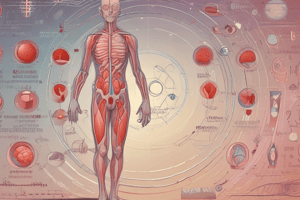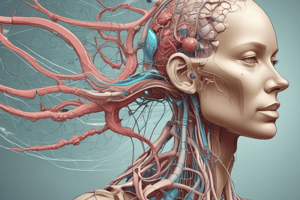Podcast
Questions and Answers
Which factor plays a significant role in hemostasis?
Which factor plays a significant role in hemostasis?
- Vitamin D
- Eicosanoids
- Anticoagulants
- Von Willebrand factor (correct)
What is the main function of aldosterone in the body?
What is the main function of aldosterone in the body?
- Inhibits glucose metabolism
- Regulates blood pressure by controlling sodium and potassium levels (correct)
- Stimulates red blood cell production
- Promotes the breakdown of proteins
Which condition is associated with deficiencies in the clotting cascade?
Which condition is associated with deficiencies in the clotting cascade?
- Hemophilia A (correct)
- Hypocalcemia
- Osteoporosis
- Hyperthyroidism
What is the primary role of calcitonin in calcium homeostasis?
What is the primary role of calcitonin in calcium homeostasis?
Which molecule is primarily involved in collagen synthesis and maintenance?
Which molecule is primarily involved in collagen synthesis and maintenance?
Flashcards
Hemostasis
Hemostasis
The process of stopping bleeding by forming a blood clot to seal a damaged blood vessel. It involves a complex cascade of events including platelet activation, coagulation factors, and fibrin formation.
Hemophilia A
Hemophilia A
A genetic bleeding disorder caused by a deficiency in factor VIII, a protein that plays a crucial role in blood clotting. It's characterized by prolonged bleeding after minor injuries or procedures.
Thyroid Hormone
Thyroid Hormone
Hormones produced by the thyroid gland, primarily T3 (triiodothyronine) and T4 (thyroxine), critical for regulating metabolism, growth, and development.
Eicosanoids
Eicosanoids
Signup and view all the flashcards
Plaque
Plaque
Signup and view all the flashcards
Study Notes
Blood
- Blood 1: Heme Synthesis and Degradation: Focus on the processes of heme synthesis and breakdown.
- Blood 2: Hemostasis: Understand the mechanisms of blood clotting and stopping bleeding.
- Blood 3: Anticoagulants: Learn about substances that prevent blood clotting.
- Blood 4: Biochemical Measurements: Review the measurement techniques for various blood components.
- Clinical Correlation (Hemophilia A, B, and von Willebrand Disease): Study these bleeding disorders, their causes, and treatments.
Endocrinology
- Endocrinology 1: Molecular Endocrinology: Examine the molecular basis of endocrine function.
- Endocrinology 2: Hypothalamus, Pituitary, Growth Hormone: Understand the roles of these structures in regulating growth and development.
- Endocrinology 3: Thyroid Hormone, Aldosterone, Cortisol, Eicosanoids: Review the roles of these hormones and their impact on the body.
Oral Tissues
- Oral Tissues 1: Collagens and Elastin, Gum Bleeding: Focus on these components' roles in oral structure and gum health.
- Oral Tissues 2: Bone and Teeth: Study the structure and development of bone and teeth.
- Oral Tissues 3: Calcium, Parathyroid Hormone, Vitamin D, Calcitonin: Understand the regulation of calcium levels and the roles of these hormones.
- Oral Tissues 4: Saliva: Explore the composition, function, and clinical significance of saliva.
- Oral Tissues 5: Plaque, Caries, Fluoride, Reactive Oxygen Species: Understand the contributing factors to oral diseases and the defense mechanisms.
- Clinical Correlation: Oral Cancer: Learn about the causes, risk factors, and treatment options for oral cancer.
Studying That Suits You
Use AI to generate personalized quizzes and flashcards to suit your learning preferences.




